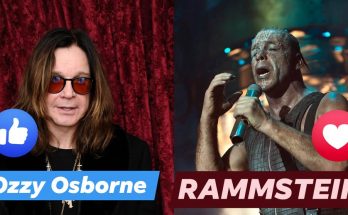Dan Reynolds and Tyler Joseph occupy a unique place in modern music—a rare intersection between vulnerability and spectacle, intimacy and rebellion. As the creative forces behind Imagine Dragons and Twenty One Pilots, respectively, both men have built empires not merely from melodies and beats, but from emotion, honesty, and the courage to say what others suppress. In an age where pop and rock often collide into glossy, manufactured soundscapes, Reynolds and Joseph have turned their pain into poetry, their introspection into anthems, and their artistic risk-taking into a cultural movement that continues to reshape pop-rock’s DNA.
For Dan Reynolds, frontman of Imagine Dragons, the journey began with an almost defiant insistence on individuality. Emerging from the Las Vegas music scene, Reynolds forged a sound that was impossible to categorize—too experimental for mainstream pop, too polished for raw indie rock. Yet it was that very tension that birthed a genre-defying identity. From the thunderous drumlines of “Radioactive” to the cinematic intensity of “Believer,” Imagine Dragons mastered the art of making personal turmoil feel universal. Reynolds has long spoken openly about his battles with depression, his crises of faith, and the weight of fame, but his genius lies in translating those struggles into soundscapes that radiate both darkness and light. When he roars “Pain! You made me a believer,” it isn’t just a hook—it’s a revelation, a statement of survival.
Tyler Joseph’s path has been just as bold, but his canvas feels even more psychological, almost labyrinthine. As the lyrical and emotional architect of Twenty One Pilots, Joseph crafts music that lives in the space between anxiety and faith, self-doubt and defiance. Alongside drummer Josh Dun, he’s turned vulnerability into rebellion, painting mental health struggles not as weakness but as a battle cry. Songs like “Stressed Out,” “Car Radio,” and “Ride” have become generational anthems precisely because Joseph doesn’t pretend to have the answers—he simply articulates the questions everyone else is too afraid to ask. His lyrics often read like diary entries wrapped in allegory, reflecting a restless mind wrestling with purpose and identity in a digital world that never stops shouting.
What unites Reynolds and Joseph, beyond their stadium-sized fanbases and chart dominance, is their fearless reinvention of pop-rock’s emotional core. Where earlier generations used distortion and rebellion to challenge authority, they use vulnerability to challenge apathy. Both artists have embraced the idea that real strength lies in emotional honesty. In their hands, pop-rock is no longer about bravado—it’s about bearing the soul, unfiltered and unashamed. Their soundscapes—dense with layered percussion, soaring synths, and emotionally charged vocals—serve as modern hymns for those navigating chaos, loneliness, and self-discovery.
Reynolds’s approach to songwriting often begins with chaos and catharsis. He doesn’t write songs as much as he exhales them. His lyrics are born from lived pain—his struggles with autoimmune disease, the turbulence of fame, and his complicated relationship with religion. What makes his writing powerful isn’t the pain itself but his refusal to sanitize it. He transforms despair into electricity, shame into rhythm. Tracks like “Demons” and “Whatever It Takes” are layered confessions disguised as radio hits. Beneath the polished production lies a man still learning how to forgive himself, to find grace amid the noise. Reynolds once said that his goal was “to connect people through honesty,” and it’s that mission that keeps Imagine Dragons from ever becoming predictable. For all the bombast, their music is a mirror reflecting the modern listener’s own contradictions—bold yet broken, hopeful yet haunted.
Tyler Joseph, meanwhile, treats songwriting like therapy—often messy, sometimes cryptic, but always deeply personal. Twenty One Pilots’ discography unfolds like a concept map of his psyche, a world of characters and metaphors designed to externalize inner demons. His alter ego “Blurryface” personifies insecurity, doubt, and self-sabotage. It’s a bold narrative device that transforms private emotion into myth, allowing listeners to see their own anxieties in a larger, almost heroic context. Joseph’s voice—equal parts whisper and shout—captures the fragile duality of the human spirit: the yearning to be seen, and the fear of being known. Where Reynolds channels pain into power, Joseph dissects it, deconstructing every thought until it becomes a conversation between himself and his audience. That intimacy has made him one of the most emotionally resonant lyricists of his generation.
The production styles of both artists also redefine how emotion is translated sonically. Reynolds and Imagine Dragons craft grand, cinematic arrangements that blend electronic pulse with primal energy—music that feels built for both headphones and arenas. Joseph’s work with Twenty One Pilots, on the other hand, feels deliberately minimalist yet deeply textured, often fusing piano ballads, hip-hop rhythms, and electronic experimentation into something that defies categorization. Each sound choice—every bass hit, every layered harmony—serves the emotion first. It’s not about complexity for complexity’s sake; it’s about creating an atmosphere where vulnerability feels safe, even sacred.
In a broader sense, both musicians represent a generational shift in how artists connect with audiences. Gone are the days when rock stars were untouchable icons. Reynolds and Joseph have redefined fame through openness, inviting fans into their struggles instead of hiding behind personas. They speak about mental health, self-worth, and authenticity not as branding tools but as survival mechanisms. When Dan Reynolds founded the LoveLoud Festival, aimed at promoting LGBTQ+ acceptance and mental health awareness, it wasn’t a PR move—it was personal. Having grown up in a conservative religious environment, Reynolds turned his platform into a force for empathy and inclusion. Similarly, Joseph’s candid discussions about anxiety and faith have helped destigmatize emotional vulnerability in a culture that often equates masculinity with stoicism. Their artistry is as much about healing as it is about sound.
The power of both artists also lies in their audiences. Imagine Dragons and Twenty One Pilots have cultivated fanbases that don’t just listen—they live the music. Their concerts feel less like performances and more like communal experiences, where emotion pulses through the crowd like a shared heartbeat. The fans know every lyric, every pause, every breath. For many, their songs are lifelines, words to hold onto when the world feels too heavy. Reynolds and Joseph understand this responsibility. They don’t just sing about survival—they model it, showing that art can be both a refuge and a revolution.



